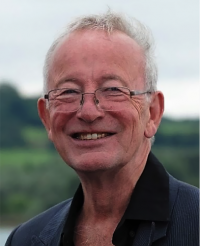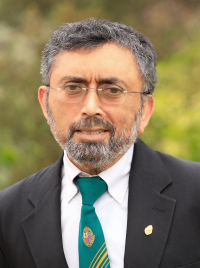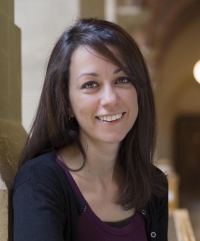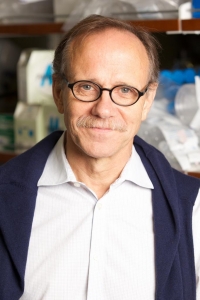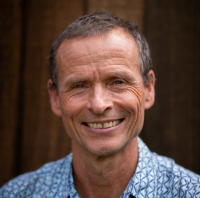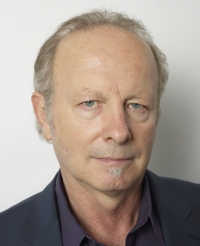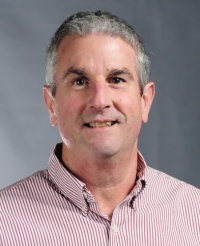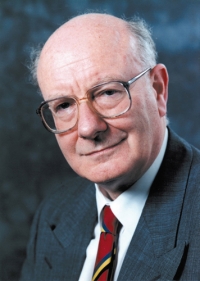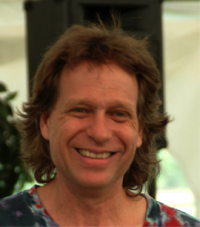Awareness of Death and Personal Mortality: Implications for Anthropogeny
Biographical Sketches: Co-Chairs
Senior Member, Darwin College, University of Cambridge
Nicholas Humphrey is a theoretical psychologist who has migrated from neurophysiology, through animal behaviour to evolutionary psychology and the study of consciousness. He did research on mountain gorillas with Dian Fossey in Rwanda, he was the first to demonstrate the existence of “blindsight” after brain damage in monkeys, he proposed the celebrated theory of the “social function of intellect”, and he has recently explained the evolutionary basis of the placebo effect. He has held positions at the universities of Oxford and Cambridge, and is now emeritus professor at the LSE. Honours include the Martin Luther King Memorial Prize, the Pufendorf medal and the International Mind and Brain Prize.
UC San Diego School of Medicine
Ajit Varki is a Distinguished Professor of Medicine and Cellular & Molecular Medicine, Emeritus Co-Director of CARTA, Emeritus Co-Director of the Glycobiology Research and Training Center at UC San Diego, and Adjunct Professor at the Salk Institute. He received basic training in physiology, medicine, biology, and biochemistry at the Christian Medical College (CMC), Vellore, The University of Nebraska, and Washington University in St. Louis. He also has formal training and board certification in internal medicine, hematology, and oncology. Varki is the executive editor of Essentials of Glycobiology (Cold Spring Harbor Press, 4th Edition, 2022) and is recipient of a MERIT award from the NIH, and an American Cancer Society Faculty Research Award. Honorific elections include the American Academy of Arts and Sciences, the National Academy of Medicine, the American Society for Clinical Investigation, and the Association of American Physicians. He is also recipient of the three highest honors in his field, the Karl Meyer Award of the Society for Glycobiology, the International Glycoconjugate Organization Award and the Rosalind Kornfeld Award for Lifetime Achievement in Glycobiology. He is recognized for creating the first major open access research journal (J. Clin. Invest., 1996) as well as the first major open access textbook (Essentials of Glycobiology, 2009). He was honored with the Old Cottonian of Eminence Award at the 150th Anniversary of Bishop Cotton Boys School, Bangalore, India, (2015) as well as a Distinguished Faculty Medal and Oration at his medical school alma mater, CMC, Vellore. Significant past appointments include: Co-Head, UC San Diego Division of Hematology-Oncology; President of the Society for Glycobiology; Editor-in-Chief of the Journal of Clinical Investigation; Interim Director of the UC San Diego Cancer Center, President of the American Society for Clinical Investigation, and UC San Diego Associate Dean for Physician-Scientist Training. Varki's research interests are focused on a family of cell surface sugars called sialic acids, and their roles in biology, evolution and disease. Currently, active projects are relevant to the roles of sialic acids in microbial infectivity, the regulation of the immune response, the progression and spread of tumors, aging, and unique aspects of human evolution. His group is particularly intrigued to find multiple interrelated differences in sialic acid biology between humans and our closest evolutionary cousins, the "great apes." These differences are a signature of the events that occurred during the last few million years of human evolution, and appear to be relevant to understanding several aspects of the current human condition, both in health and disease. Varki’s book, Denial (Twelve, Hachette Books, 2013), explores a novel "Mind Over Reality Transition” (MORT) theory that denying reality and personal mortality was a key step in allowing the emergence of a full theory of mind, and in the origin of our species.
Biographical Sketches: Speakers
London School of Economics & Political Science
Rita Astuti is a social anthropologist. She teaches at the Anthropology Department of the London School of Economics and has conducted extensive periods of fieldwork in a fishing village in Madagascar. She has published an ethnographic monograph on kinship, death and identity (People of the Sea 1995, CUP). In collaboration with developmental psychologists, she has reanalyzed her ethnographic findings through the use of experimental techniques (for example, in Constraints on Conceptual Development, 2004, SRCD Monographs). In her publications and in her teaching, she has advocated a closer integration between anthropology and psychology.
University of Rochester
Dora Biro received her PhD from Oxford University in 2002. She subsequently held a JSPS postdoctoral research fellowship and a visiting professorship at the Primate Research Institute of Kyoto University, Japan, before returning to Oxford as a Royal Society University Research Fellow in 2007. She is currently Beverly Petterson Bishop and Charles W. Bishop Professor of Brain and Cognitive Sciences Professor of Brain and Cognitive Sciences, University of Rochester, and a Fellow of St Hugh’s College. Her research interests are centred on animal cognition, including navigation, numerical competence, tool use, culture and collective decision-making.
Salk Institute for Biological Studies
Fred H. Gage is a Professor in the Laboratory of Genetics and the past President (2018-2023) of the Salk Institute. He is an Adjunct Professor at UC San Diego, and emeritus Co-Director of CARTA. Dr. Gage concentrates on the adult central nervous system and unexpected plasticity and adaptability to environmental stimulation that remains throughout the life of all mammals. His work may lead to methods of replacing or enhancing brain and spinal cord tissues lost or damaged due to Neurodegenerative disease or trauma. Gage's lab showed that, contrary to accepted dogma, human beings are capable of growing new nerve cells throughout life. Small populations of immature nerve cells are found in the adult mammalian brain, a process called Neurogenesis. He is working to understand how these cells can be induced to become mature functioning nerve cells in the adult brain and spinal cord. They showed that environmental enrichment and physical exercise can enhance the growth of new brain cells and they are studying the underlying cellular and molecular mechanisms that may be harnessed to repair the aged and damaged brain and spinal cord. Gage is a member of the National Academy of Science and the Institute of Medicine.
UC San Diego
Pascal Gagneux is CARTA's Executive Co-Director, a Professor of Pathology and Anthropology, and the Department Chair of Anthropology at UC San Diego. He is interested in the evolutionary mechanisms responsible for generating and maintaining primate molecular diversity. The Gagneux laboratory studies cell-surface molecules in closely related primates species. His focus is on glycans, the oligosaccharides attached to glycolipids and glycoproteins of the surfaces of every cell and also secreted into the extra-cellular matrix. Gagneux's laboratory is exploring the roles of molecular diversity in protecting populations from pathogens as well as potential consequences for reproductive compatibility. Dr. Gagneux’s interest is in how glycan evolution is shaped by constraints from endogenous biochemistry and exogenous, pathogen-mediated natural selection, but could also have consequences for sexual selection. Dr. Gagneux has studied the behavioral ecology of wild chimpanzees in the Taï Forest, Ivory Coast, population genetics of West African chimpanzees, and differences in sialic acid biology between humans and great apes with special consideration of their differing pathogen regimes. In 2011, while Associate Director of CARTA, Dr. Gagneux helped to establish a graduate specialization in Anthropogeny at UC San Diego. This wholly unique graduate specialization is offered through eight participating graduate programs in the social and natural sciences at UC San Diego.
Harvard University
Paul Harris is a developmental psychologist. He taught in Oxford for 20 years before moving to Harvard in 2001 where he is the Victor S. Thomas Professor of Education. His recent books focus on the development of children’s imagination (The work of the Imagination, published by Blackwell/Wiley in 2000) and children’s learning from other people (Trusting what You’re Told: How Children Learn from Others, published by HUP in 2012).
New York University
Joseph LeDoux is the Henry and Lucy Moses Professor of Science at NYU in the Center for Neural Science, and he directs the Emotional Brain Institute of NYU and the Nathan Kline Institute. He also a Professor of Psychiatry and Child and Adolescent Psychiatry at NYU Langone Medical School. His work is focused on the brain mechanisms of memory and emotion and he is the author of The Emotional Brain, Synaptic Self, and Anxious. LeDoux has received a number of awards, including the Karl Spencer Lashley Award from the American Philosophical Society, the Fyssen International Prize in Cognitive Science, Jean Louis Signoret Prize of the IPSEN Foundation, the Santiago Grisolia Prize, the American Psychological Association Distinguished Scientific Contributions Award, the American Psychological Association Donald O. Hebb Award, and Jean-Marie Delwart Foundation 2016 International Prize for Molecular and Cellular Mechanisms Underlying Mood. His book Anxious received the 2016 William James Book Award from the American Psychological Association. LeDoux is a Fellow of the American Academy of Arts and Sciences, the New York Academy of Sciences, and the American Association for the Advancement of Science, and a member of the National Academy of Sciences. He is also the lead singer and songwriter in the rock band, The Amygdaloids (amygdaloids.com), and the acoustic duo, So We Are (soweare.net).
University of Washington
John Marzluff is James W. Ridgeway Professor of Wildlife Science at the University of Washington. His graduate (Northern Arizona University) and initial post-doctoral (University of Vermont) research focused on the social behavior and ecology of jays and ravens. He continues this theme investigating the intriguing behavior of crows, ravens, and jays. With colleagues at the University of Washington’s Department of Radiology he is applying neuroimaging techniques to understand the neural circuits underlying various aspects of crow behavior including their ability to recognize dangers and opportunities. His research team also focuses on the effects of urbanization and agriculture on songbirds in the Seattle area, and the effects of recreation on high elevation birds in Denali National Park. He teaches Ornithology, Governance and Conservation of Rare Species, Field Research in Yellowstone, and Natural and Cultural History of Costa Rica.
Professor Marzluff has written five books and edited several others. His most recent book Welcome to Subirdia (2014 Yale) discovers that moderately settled lands host a splendid array of biological diversity and suggests ways in which people can steward these riches to benefit birds and themselves.
University of Cambridge
Colin Renfrew was Professor Emeritus of Archaeology at the University of Cambridge and founding Director of the McDonald Institute for Archaeological Research. He excavated prehistoric sites in Greece and in the Orkney Islands, and was interested in archaeological theory including cognitive archaeology. He passed away on November 24, 2024 at the age of 87.
Skidmore College
Sheldon Solomon is Professor of Psychology at Skidmore College. His studies of the effects of the awareness of death on human behavior are supported by the National Science Foundation and Ernest Becker Foundation, and featured in the documentary film Flight from Death: The Quest for Immortality. He is co-author of In the Wake of 9/11: The Psychology of Terror and The Worm at the Core: On the Role of Death in Life. Sheldon is an American Psychological Society Fellow, a recipient of an American Psychological Association Presidential Citation, and a Lifetime Career Award by the International Society for Self and Identity.
